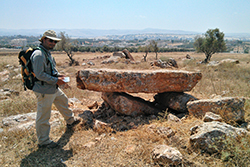Home » Digital Humanities » Computational Archaeologist Isaac Ullah to Present Lecture at DH Center on October 2
Computational Archaeologist Isaac Ullah to Present Lecture at DH Center on October 2
Posted by vrcvanderbilt on Wednesday, September 26, 2018 in Digital Humanities, Events, HART, Lectures, News, Technology, Vanderbilt University, VRC.
 Isaac Ullah, assistant professor of anthropology, San Diego State University, will deliver a lecture on “Computational Modeling, Archaeology, and the Anthropocene” at the Center for Digital Humanities on Tuesday, October 2, from 3:00-4:30 pm.
Isaac Ullah, assistant professor of anthropology, San Diego State University, will deliver a lecture on “Computational Modeling, Archaeology, and the Anthropocene” at the Center for Digital Humanities on Tuesday, October 2, from 3:00-4:30 pm.
Ullah (PhD, Arizona State University, 2013) is a computational archaeologist who employs GIS and simulation modeling to understand the long-term dynamics of humans and the Earth System. He is particularly interested in the social and environmental changes surrounding the advent of farming and animal husbandry. His focus is on Mediterranean and other semi-arid landscapes, and he conducts fieldwork in Jordan, Italy, and Kazakhstan. His field work includes survey for and excavation of early agricultural sites as well as geoarchaeological analyses of anthropogenic landscapes. His specialties include landscape evolution, complex adaptive systems science, computational methods, geospatial analysis, and imagery analysis.
In his lecture Ullah will discuss a computational archaeology approach that takes the perspective that the Anthropocene is the accumulated physical record of ancient “Social-Ecological Systems” (SES). “I will discuss how we can build, test, and use simulation models from archaeological data, and will showcase a suite of new modeling validation techniques that can help us connect simulation results to the physical proxy record of past human land-use to help us verify model output,” said Ullah. “These new techniques are expandable and ultimately should help us to more fully understand the dynamics of SES in the Anthropocene.”
Cosponsors for the lecture are the Department of Earth & Environmental Sciences, the Program in Environmental and Sustainability Studies, the Department of the History of Art, the Program in Classical and Mediterranean Studies, and the Department of Anthropology.

©2024 Vanderbilt University ·
Site Development: University Web Communications